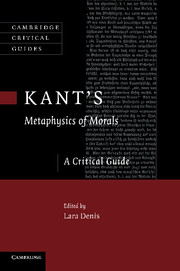Book contents
- Frontmatter
- Contents
- Notes on contributors
- Acknowledgements
- List of translations and abbreviations
- Introduction
- 1 Kant's Metaphysics of Morals: the history and significance of its deferral
- 2 Reason, desire, and the will
- 3 Justice without virtue
- 4 Kant's innate right as a rational criterion for human rights
- 5 Intelligible possession of objects of choice
- 6 Punishment, retribution, and the coercive enforcement of right
- 7 Moral feelings in the Metaphysics of Morals
- 8 What is the enemy of virtue?
- 9 Freedom, primacy, and perfect duties to oneself
- 10 Duties to and regarding others
- 11 Duties regarding animals
- 12 Kant's Tugendlehre as normative ethics
- Bibliography
- Index
- References
3 - Justice without virtue
Published online by Cambridge University Press: 10 January 2011
- Frontmatter
- Contents
- Notes on contributors
- Acknowledgements
- List of translations and abbreviations
- Introduction
- 1 Kant's Metaphysics of Morals: the history and significance of its deferral
- 2 Reason, desire, and the will
- 3 Justice without virtue
- 4 Kant's innate right as a rational criterion for human rights
- 5 Intelligible possession of objects of choice
- 6 Punishment, retribution, and the coercive enforcement of right
- 7 Moral feelings in the Metaphysics of Morals
- 8 What is the enemy of virtue?
- 9 Freedom, primacy, and perfect duties to oneself
- 10 Duties to and regarding others
- 11 Duties regarding animals
- 12 Kant's Tugendlehre as normative ethics
- Bibliography
- Index
- References
Summary
INTRODUCTION
An Aristotelian friend recently proposed to me an interpretation of the Doctrine of Right according to which Kant is best read as distinguishing between “acting justly” and “being just.” On that distinction, it is possible for a person to act justly without, in so acting, being just. Alternatively, in acting justly a person may simultaneously be just. The first person acts justly without making it her maxim so to act; the second person makes acting justly her maxim. This Aristotelian reading finds support in Kant's characterization of duties of justice as “indirect” ethical duties (MS 6:219): all juridical duties are at the same time indirect ethical duties in that we should make it our maxim to act from juridical duties rather than merely in accordance with them. The reading does not deny that acting in mere outward conformity with justice is in some sense sufficient for the fulfillment of our juridical duties; however, the claim is that the person who also makes it her maxim to act from those duties is more fully just. It is an intuitively attractive reading: we do not want persons to act in mere outward conformity with justice – we want them to “internalize” the demands of justice, to act justly from inner conviction. Many believe that this must be Kant's position, given his apparent claim in the Groundwork that our capacity for self-legislation constitutes the ground of morality in general.
Keywords
- Type
- Chapter
- Information
- Kant's Metaphysics of MoralsA Critical Guide, pp. 51 - 70Publisher: Cambridge University PressPrint publication year: 2010
References
- 9
- Cited by

